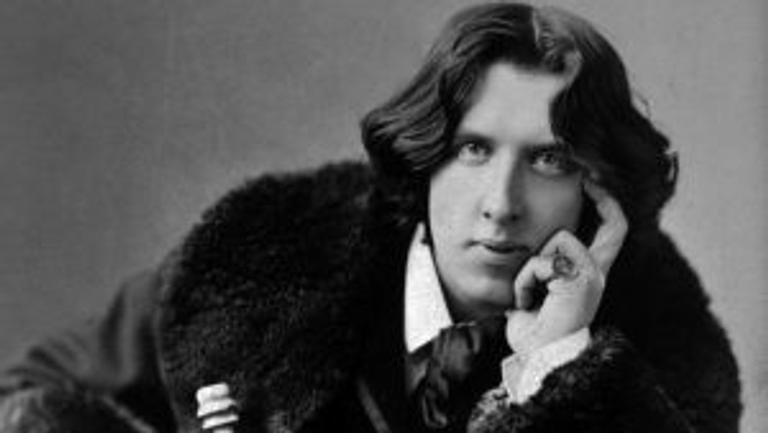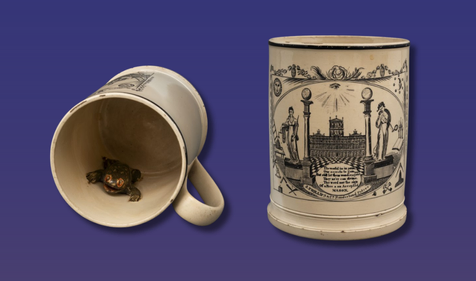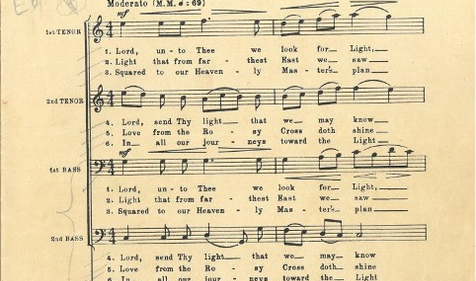Similar to his body of literary work, the life of Brother Oscar Wilde was grandiose, full of wit, and pondered life and society’s greater meaning. Learn more about the poetic Freemason, Oscar Wilde.
“It is what you read when you don't have to that determines what you will be when you can't help it.” - Oscar Wilde
Few Freemasons are as esteemed globally as the English writer and poet Oscar Wilde. Although lesser known in Masonic circles among other Freemason literary heroes such as Burns, Goethe, and Kipling, the celebrated author of the comedy The Importance of Being Earnest and the gothic novel The Picture of Dorian Gray was indeed a Freemason. Similar to his body of literary work, the life of Brother Oscar Wilde was grandiose, full of wit, and pondered life and society’s greater meaning.
Early Life and Masonic Career of Oscar Wilde

Brother Wilde was born in Dublin, Ireland on October 18, 1854. A literary prodigy at a young age, Wilde won the highest honor awarded by receiving the Royal School Scholarship at Trinity College. Soon after enrolling in Trinity College, he was admitted to the Magdalen College in Oxford and moved his life and career to England.
At Oxford, Wilde was a popular student admired by his peers. It was one of his most privileged friends at the time, Prince Leopold, the sixth son of Queen Victoria, that would incite his interest in Freemasonry. Brother Leopold was already an active Freemason at the time, having held positions such as Junior Grand Warden, Worshipful Master, and Provincial Grand Master, and encouraged Wilde to join the university’s prestigious lodge, Apollo University Lodge No. 357. The Apollo Lodge holds the same esteem to this day.
Brother Wilde’s interest in Freemasonry was also likely a result of his father, Sir Wiliam Robert Wills Wilde, who had been an active Mason in Ireland.
Wilde was proposed to the Apollo University Lodge on February 16, 1875 and was initiated soon after on February 23. A diary entry from a close friend and, at the time, Secretary of Apollo University Lodge, J. E. C. Bodley details some of the early conversations Wilde had with his friends around Freemasonry:
Sunday 21 February 1875
Fitz & Wilde breakfasted with me at Mitre at 11. Went down with Wilde to Corpus found the Count (W.O Goldschmidt) dressing & screwed him round to Christ Church where he was lunching. We called on Williamson where we had a long talk on Masonry. He produced his properties and Wilde was much struck by their gorgeousness, and he was amazed (dismayed?) at the mystery of our conversation.
Brother Wilde was an active and engaged member during his years in Freemasonry. He received two degrees beyond the blue lodge, the Mark Master Mason degree and the 18th degree of the Ancient and Accepted Scottish Rite. On November 27, 1876, Wilde was perfected into the 18th degree of the Rose Croix at the Oxford University Chapter, No. 401.
In 1876, Wilde joined a second lodge, the Churchill Lodge No. 478 and became a Junior Deacon in 1877. Unfortunately, his Masonic journey ended following his four years in school where he separated himself from Roman Catholicism and active participation in Freemasonry. He was dropped from Apollo University Lodge in 1878 for “non-payment of dues” (NPD) and was similarly removed from the Churchill Lodge in 1883.
While his participation in Freemasonry may have been short lived, much of his life’s work and philosophies share similarities with the values and interests of Freemasons.
Celebrity, Drama, and Controversy: The Career of Oscar Wilde
While Brother Wilde’s works are widely celebrated today, he was quite a controversial figure in Victorian England.
Wilde was born into a family of literary geniuses. His father was not only Ireland’s leading ear and eye surgeon, but also a published author on books on archaeology, folklore, and the satirist Jonathan Swift. His mother, who wrote under the name Speranza, was a poet and an authority on Celtic myth and folklore. It should come as no surprise then that Brother Wilde’s legacy today lives through his witty and satirical writings and love for beauty and romanticism, whether in design, fashion, or poetry.
During his time at university, Wilde first found fame after winning the coveted Newdigate Prize for his long poem, Ravenna. From there, his celebrity status only skyrocketed. He continued to publish poems and other short writings and positioned himself as the spokesman for the Aesthetic Movement in England, promoting “art for art’s sake.” In fact, Wilde self-titled himself as “Professor of Aesthetics.2” In the early 1880s, when “Aestheticism” was a controversial movement in London, Wilde established himself in social and artistic circles by his wit and flamboyance - both to his acclaim and, later, punishment.
He became a global phenomenon for his love of art, which he lectured about to full theatres across America and England. However, it was this love of beauty that would cut his life of freedom and artistic expression short. Wilde spent two years in prison from 1895 to 1897 after being prosecuted by the Marquess of Queenberry for homosexuality, which was outlawed at the time. When he was released from prison, he fled to France where he spent his final years.
The last decade of his life is when Brother Wilde wrote most of his work that we know and love today. In the last decade of his life, Oscar Wilde wrote The Picture of Dorian Gray, The Importance of Being Earnest, An Ideal Husband, among many others.
Wilde’s Life, Work, and Hints of Freemasonry
From the published work of Oscar Wilde, many historians and fans have noticed similarities between Freemasonry and Brother Wilde’s life and writing. While Wilde never references operative or speculative Freemasonry directly in his work, his comments often mirrored Masonic points of view.
As noted by Brother Mark Dreisonstok in the Scottish Rite Journal, in the Decay of Living, Wilde states that “if nature had been comfortable, mankind would have never invented architecture,” which Dreisonstock claims is “consistent with the Masonic view that man found nature raw and, imitating the divine plan, began to design, with the plans which he laid down being improved by experience and time.
Brother Wilde also held a love for costume, similar to Masons. During his 1882 tour in America, Wilde faced hostility in the press for his flamboyant attire, which included a velvet jacket, knee breeches, and black silk stockings. Brother Beresinger, who studied Wilde’s Masonic legacy in depth, noted that:
“...just a week after his arrival to America for his extended literary tour, Wile was on stage for the first time in Chickering Hall on 5th Avenue and 18th Street. The 1247 seating capacity was filled to the brim and even standing room tickets were sold out. Colonel W F Morse, the manager of the lecture tour, introduced Oscar Wilde who slowly walked unto the stage wearing the very conspicuous knee breeches and silk stockings and low shoes with bright buckles...Some thought this was English court dress and no one knew that the last time Oscar had worn this attire was at a meeting at the Apollo lodge in Oxford.”
Several others have called out other links to Freemasonry in Wilde’s life and work, though many are too vague to be confirmed.
On November 30, 1900 Brother Wilde received his Summons to the Eternal Grand Lodge at the young age of 46. While his life was short, his immortal words continue to live on in the hearts of people at nearly every corner of the globe.
Interested in learning about other famous Freemasons? Read our blog on Mozart: The Musical Freemason.
Related Stories
Discover additional Scottish Rite blogs and news on this topic.



